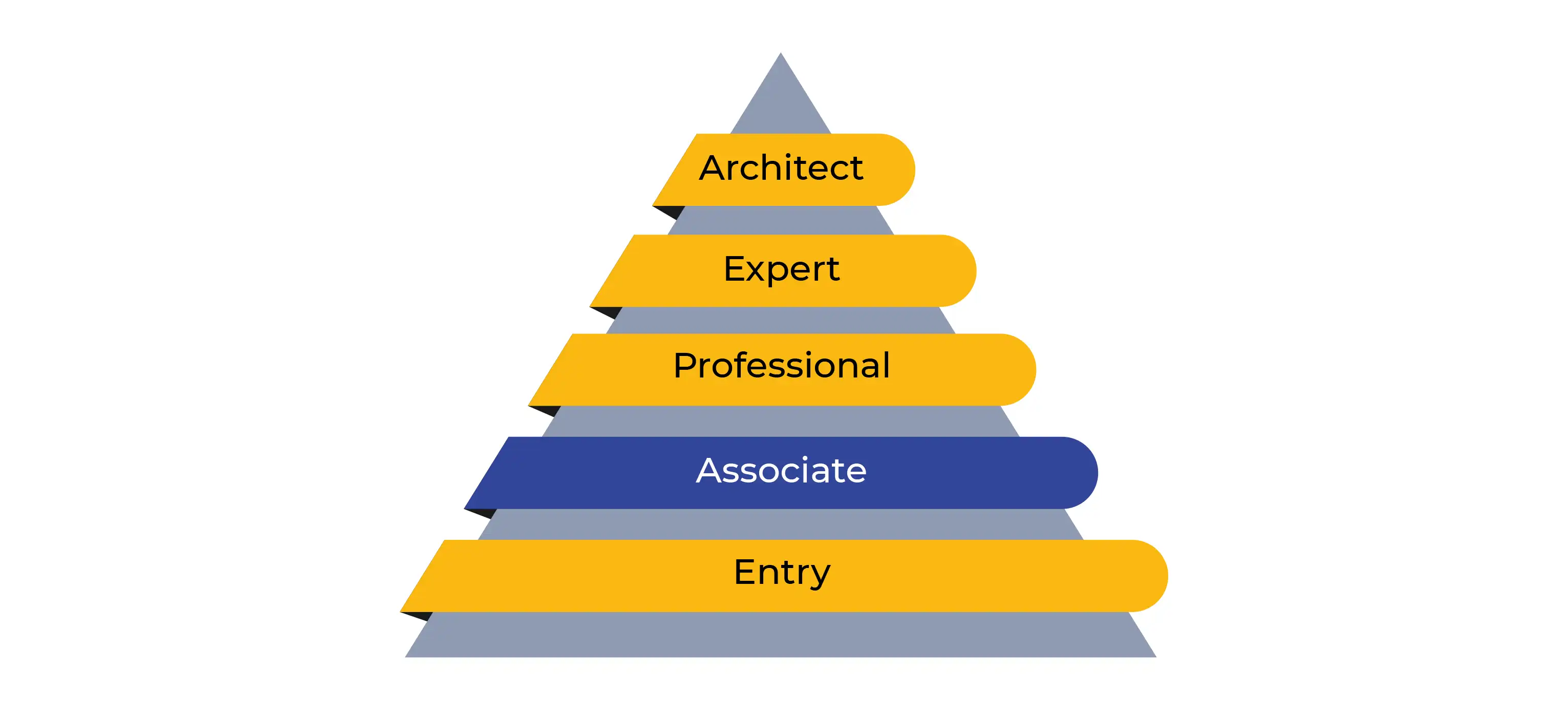Overview Of CCNA Training in Dubai
Networks are the foundation of our digital infrastructure, facilitating smooth communication and data transfer. As the world becomes increasingly interconnected and data usage expands, proficient CCNA-certified experts are essential for creating, executing, and managing reliable networks. A networking career path is rock solid and is never going to go away like that of a plumber or electrician since the demand for data consumption only increases. It is among the few IT career paths that are resistant to AI.
The Cisco Certified Network Associate (CCNA) is a premier entry-level IT security certification, highly esteemed globally. Acquiring a CCNA certification provides a foundation for pursuing various other Cisco certifications such as CCNP Enterprise, CCNP Security, CCNP Datacenter, CCNP Service Provider, CCNP Collaboration, and advanced-level certificates like CCIE. Edoxi in Dubai offers an extensive 40+ hour training program for the CCNA certification. Our training ensures thorough preparation for the 200-301 CCNA exam.

Through Edoxi's CCNA Course, you will gain knowledge of fundamental networking concepts and technologies, including but not limited to practical labs on Cisco IOS, IP address configuration, various routing protocols, troubleshooting, VLAN configuration, and network security using Access Control Lists (ACLs) etc. To enrol in our CCNA course, simply send an inquiry to receive expert academic guidance. Take the first step towards a fulfilling career in IT and Networking by joining EDOXI's CCNA Course, which includes theoretical learning and hands-on lab exercises. Embark on your journey towards a successful IT and networking career today!
Benefits of CCNA Certification in Dubai
- Gain Recognition: After clearing the 200-301 CCNA exam, you will earn the CCNA logo and a unique certification ID. This is issued by Cisco and employers can verify your credentials which serves as a testament to the knowledge and skills you've gained. Candidates can include the CCNA-certified logo and certification ID in their resume to improve their chances of getting shortlisted for IT jobs.
- Prepare for the 200-301 CCNA exam: Our CCNA training aligns with the latest CCNA exam outline, so you can be sure you are learning the most up-to-date skills and attend the 200-301 CCNA exam confidently.
- A Door to Future Certifications: Our training prepares you for the CCNA certification, which is a prerequisite for obtaining expert-level Cisco professional certifications like CCNP and CCIE.
- Better Salary: Based on recent statistics, the estimated salary potential for a Cisco Certified Network Associate (CCNA) will increase by 12 % over 5 years.
- Career Advancement: CCNA certification can enhance your career prospects in IT. It is often a prerequisite for networking and IT infrastructure-related job roles.
- Stay up-to-date with the Industry Trends: The latest CCNA course provides you with valuable skills and knowledge, and helps you stay ahead of the curve with the latest industry trends such as network automation and programmability.
CCNA Course Features
-
40+ Hours of In-depth Training:
You will undergo 40 hours of comprehensive training and will learn everything about the networking field.
-
Most up-to-date Official Cisco Curriculum
Our curriculum is meticulously crafted to match Cisco's latest 200-301 exam syllabus, ensuring you learn the most current topics, including Automation and Programmability.
-
Hands-On Lab Experience
You will dive into practical lab sessions, where you'll gain firsthand experience configuring and troubleshooting a variety of network systems.
-
Flexible Schedules
We provide weekend/weekday as well as online/in-person learning options for the CCNA course, so you can choose the format that is most convenient for you.
-
Experienced Instructors
Our industry-led instructors will impart practical and theoretical knowledge of Network fundamentals, Network access, IP connectivity, IP services, Security fundamentals and Automation and programmability.
-
Certification and Recognition:
After successfully passing the CCNA exam, you will earn the prestigious CCNA certification and badge, recognised across the industry as a mark of networking proficiency.
Industries Looking For CCNA Professionals
- Information Technology (IT) Sector
- Finance and Banking
- Manufacturing and Industrial
- Telecommunications
Prerequisites for CCNA Course
-
- There are no formal educational prerequisites for learning CCNA or taking the CCNA exam, meaning a specific degree or diploma is not required for eligibility.
- A fundamental understanding of computer operation and basic software applications is recommended. This includes knowledge of how to use an operating system, navigate through files and directories, and perform basic tasks on a computer.
CCNA Course Modules
- Module 1:Networking Fundamental (20%)
- Explain the role and function of network components
- Describe characteristics of network topology architectures
- Compare physical interface and cabling types
- Identify interface and cable issues (collisions, errors, mismatch duplex, and/or speed)
- Compare TCP to UDP
- Configure and verify IPv4 addressing and subnetting
- Describe the need for private IPv4 addressing
- Configure and verify IPv6 addressing and prefix
- Compare IPv6 address types
- Verify IP parameters for Client OS (Windows, Mac OS, Linux)
- Describe wireless principles
- Explain virtualization fundamentals (virtual machines)
- Describe switching concepts
- Module 2: Network Access (20%)
- Configure and verify VLANs (normal range) spanning multiple switches
- Configure and verify interswitch connectivity
- Configure and verify Layer 2 discovery protocols (Cisco Discovery Protocol and LLDP)
- Configure and verify (Layer 2/Layer 3) EtherChannel (LACP)
- Describe the need for and basic operations of Rapid PVST+ Spanning Tree Protocol and identify basic operations
- Compare Cisco Wireless Architectures and AP modes
- Describe physical infrastructure connections of WLAN components (AP,WLC, access/trunk ports, and LAG)
- Describe AP and WLC management access connections (Telnet, SSH, HTTP,HTTPS, console, and TACACS+/RADIUS)
- Configure the components of a wireless LAN access for client connectivity using GUI only such as WLAN creation, security settings, QoS profiles, and advanced WLAN settings
- Module 3: IP Connectivity (25%)
- Interpret the components of routing table
- Determine how a router makes a forwarding decision by default
- Configure and verify IPv4 and IPv6 static routing
- Configure and verify single area OSPFv2
- Describe the purpose of first hop redundancy protocol
- Module 4: IP Services (10%)
- Configure and verify inside source NAT using static and pools
- Configure and verify NTP operating in a client and server mode
- Explain the role of DHCP and DNS within the network
- Explain the function of SNMP in network operations
- Describe the use of syslog features including facilities and levels
- Configure and verify DHCP client and relay
- Explain the forwarding per-hop behavior (PHB) for QoS such as classification, marking, queuing, congestion, policing, shaping
- Configure network devices for remote access using SSH
- Describe the capabilities and function of TFTP/FTP in the network
- Module 5: Security Fundamentals (15%)
- Define key security concepts (threats, vulnerabilities, exploits, and mitigation techniques)
- Describe security program elements (user awareness, training, and physical access control)
- Configure device access control using local passwords
- Describe security password policies elements, such as management, complexity, and password alternatives (multi factor authentication, certificates, and biometrics)
- Describe remote access and site-to-site VPNs
- Configure and verify access control lists
- Configure Layer 2 security features (DHCP snooping, dynamic ARP inspection, and port security)
- Differentiate authentication, authorization, and accounting concepts
- Describe wireless security protocols (WPA, WPA2, and WPA3)
- Configure WLAN using WPA2 PSK using the GUI
- Module 6:Automation and Programmability (10%)
- Explain how automation impacts network management
- Compare traditional networks with controller-based networking
- Describe controller-based and software defined architectures (overlay, underlay, and fabric)
- Separation of control plane and data plane
- North-bound and south-bound APIs
- Compare traditional campus device management with Cisco DNA Center enabled device management
- Describe characteristics of REST-based APIs (CRUD, HTTP verbs, and data encoding)
- Recognize the capabilities of configuration management mechanisms Puppet, Chef, and Ansible
- Interpret JSON encoded data
Hardware Devices You Will Be Trained On
During practical lab sessions, you will gain hands-on experience configuring and troubleshooting various network systems. This includes:
- Cisco ISR Series routers (1841, 1941, 2911),
- Cisco Catalyst Series switches (2960, 3560, 9300),
- Cisco Aironet Series Wireless Access Point (WAPs) (1815, 2800),
- Cisco Firepower Next-Generation Firewalls (NGFW),
- Network Interface Cards (NICs) and various cabling types (coaxial, twisted-pair, fibre optic) to understand their specific applications.
How to Get CCNA Certification?

Locations Where Edoxi Offers CCNA Course
Upcoming Batches
| Time | 07.00 |
| Class Type | Live Training |
| Time | 07.00 |
| Class Type | Live Training |
| Time | 07.00 |
| Class Type | Live Training |
Review & Ratings



FAQs
Earning a CCNA certification opens up numerous career paths in networking and IT. Certified professionals often find roles as network administrators, network engineers, IT technicians, and security specialists. They are highly sought after in data centres, Network Operations Centers (NoCs), as well as network and IT support teams across various organizations.
All Cisco certifications including the CCNA Certification are valid for 3 years.
The average base salary of a Cisco Certified Network Associate (CCNA) in Dubai is around 480,085 AED per year. An entry-level Cisco certified network associate (CCNA) in Dubai with 1-3 years of experience earns an average salary of 333,266 AED. A senior-level Cisco certified network associate (CCNA) in Dubai with 8+ years of experience earns an average salary of 601,254 AED per year.
To earn your CCNA certification, you must pass the 200-301 CCNA exam. This exam tests your knowledge of;
- Network Fundamentals
- Network Access
- IP Connectivity
- IP Services
- Security Fundamentals
- Automation and Programmability
The duration for the 200-301 CCNA Certification test is 120 minutes.
The cost of the CCNA 200-301 exam is $300 + taxes.
Edoxi’s Cisco Certified Network Associate Training course holistically covers CCNA routing, networking, switching technologies, IP addressing, WAN technologies, Network Security fundamentals, Network Automation, and much more. Edoxi provides hands-on learning experience on Cisco devices including routers, switches, firewalls and wireless access points.
We help you clear the Cisco Network Associate examination by providing apt content and excellent guidance. Our trainers are industry professionals having years of rich experience. Instructors will help you develop a deep understanding of networking technologies and protocols.





